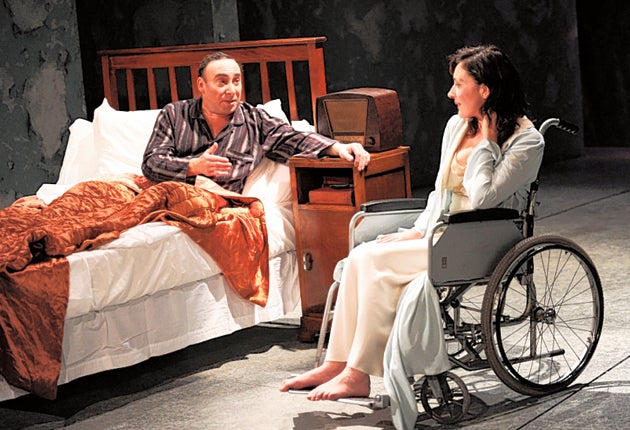Broken Glass, Tricycle Theatre, London

As the repressed accountant Phillip Gellburg, Antony Sher has dived deep into the character and let the man's skin close over him. Phillip may have patent-leather hair, his dress may be almost morbidly correct, but underneath the black suit, rats are darting, biting. The anguish isn't exaggerated, but Sher concentrates it with a force that makes us feel that Phillip, even when tongue-tied and bewildered, is a little machine whose beaky profile could cut through steel.
Phillip needs all his strength because, for the first time in his life, he is forced to confront something he doesn't understand. His wife, Sylvia, has suddenly become paralysed from the waist down, and their doctor says that her problem is psychological. Alternately sweet-talking and berating her, Phillip is terrified that he is somehow to blame for her illness, or that people will say he is. The mystery seems a shocking betrayal of a lifetime spent proving that a Jew willing to blend in and play the game can be a success in a gentile world (New York in 1938).
Iqbal Khan's swift and pointed production, the best the play has received in this country since its premiere in 1994, never makes you aware that the play lasts nearly three hours or that its dialogue is mainly inarticulate groping and homely cliché ("Women are talkers – but try and live without 'em, huh?"). Lucy Cohu is a lovely and endearing Sylvia, though too genteel and not very Jewish. Nor does Nigel Lindsay make a convincing Jewish doctor, though his odd blend of bumptiousness and self-effacement are understandable in someone playing a kind and dedicated physician whose behaviour is in fact grossly unethical. As Sylvia's outspoken sister, Emily Bruni provides much nicely judged drollery, effectively throwing away the sarcasms and verbal shrugs.
Even a staging as good as this one, however, cannot conceal the essentially false nature of Arthur Miller's play, which, despite the window dressing of Nazi atrocities, is, like After the Fall (1964), about Miller's disastrous marriage to Marilyn Monroe. Phillip's pride in the envy Sylvia's beauty creates in other men, his resentment at Sylvia's enjoyment of her work, his horror at his inability to satisfy her sexually – all this corresponds with what we know of that famous mismatch. The suggestion that Sylvia's illness is linked to her shock at Kristallnacht is a distasteful bit of borrowed significance, probably used to fend off a critical roasting, such as the one Miller received for his bad taste in dramatising his marriage in the earlier play only a year after Monroe died. But need he have bothered? Thirty years on, Miller had become a god (at least outside his own country), and exhibitionism and narcissism were rewarded rather than scorned.
The walls of Mike Britton's set are covered with large spots where the paint has been stripped away. Could this mean that the play, likewise, peels off the surface of the characters? I wonder.
To 27 November (020 7328 1000)
Join our commenting forum
Join thought-provoking conversations, follow other Independent readers and see their replies
Comments